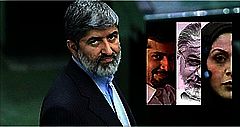How Far Will the IRGC Go in its Arrests?
» MP Ali Motahari: Arrest of Journalists is Unlawful
The Islamic Revolution Guards Corps have been busy in recent weeks arresting Iranian journalists, resulting in protests that have included those of president Rouhani as well. Majlis member Ali Motahari - the son of the ideological founder of the Islamic revolution who was assassinated in its early years – has called the recent arrests of journalists by the IRGC as unlawful. He is said the force has no jurisdiction over journalists. “The ministry of intelligence and the attorney general have not acted on the issue but the president had the duty to intervene,” he told Iran newspaper (the official government mouthpiece).
Motahari made these remarks as one of his Majlis colleagues, Nasrollah Pejman – who belongs to the hardline and conservative Jebhe Paydari Front – was gathering signatures against president Hassan Rouhani. According to him, over 100 MPs had signed a petition criticizing the president’s remarks during Tehran’s recent media exhibition. At that event, Rouhani had said, “People understand the meaning of infiltration, arrogance (reference to America) and national interests very well and feel for the future of the country. Stop going here and there to find an individual or two to find excuses and create fake law suits for them and then aggrandize them to the national level, and ultimately claim that this is the line of infiltration. Fight infiltration in the real way. Playing with words is to the detriment of the country and its national solidarity.”
Warnings about Western infiltration in Iran is a theme that was recently launched by ayatollah Khamenei.
Motahari echoed Rouhani’s words in support and said, “Infiltration can take place in any state agency. It is not right for some to single out journalists and reformists and exaggerate this. In fact, the possibility of infiltration is greatest in those place where there is the greatest display of support for the regime. It is doubtful that a person who is a public critic would be an infiltrator. A person who wants to infiltrate will first create an attractive cover for himself.”
In Tehran, four journalists have been arrested in the last two weeks: Isa Saharkhiz, Ehsan Mazandarani, Saman Safarzai and Afarin Chitsaz. After their arrest, the intelligence agency of the IRGC announced “The arrest of members of an infiltration network affiliated with American and British government by the IRGC intelligence agency” and claimed that the arrests were made after months of “continued surveillance and complete oversight of the activities of the network.”
Following this, the top commander of the IRGC associated infiltration with the fourth sedition and warned against it, all of which came after ayatollah Khamenei had issued a warning against Western influence in Iranian affairs. Sedition is a term Iranian authorities regularly use for protestors who called the 2009 presidential elections to be fraudulent, which includes leaders and supporters of the Green Movement, and other critics of the regime’s policies and practices.
The day after these arrests, channel 2 of Iran’s state-run national television network aired a program in which a person named Asef – labelled as a specialist in the intelligence agency of the IRGC – claimed that the group included “extremely destructive media activists belonging to foreign and domestic opposition media who operated in a layered fashion to create a domestic media network.”
But IRGC’s recent arrests were not confined to journalists. According to Gerdab website which is affiliated to the Revolutionary Guards, over 170 individuals had been arrested in the town of Ghazvin by the intelligence agency of the IRGC. The news site said the arrested individuals were members of a mobile social network. The report also claimed that these individuals had been engaged in indecent and vulgar media content and encouraged people to engage in indecent and immoral behavior, and published material that was insulting to ethnic groups and prominent national personalities.”
The judiciary spokesperson denied this report and said no such arrests had been made in Ghazvin, but the IRGC did not deny the report which attributes the arrests to its intelligence agency. Mohseni Ejei – a top judiciary official - however did acknowledge that not all individuals arrested by the IRGC were journalists or media activists.
The names of the non-journalist detainees have not been officially publicly announced. But the official news agency of the IRGC, Tasnim news agency, did announce the arrest of a number of individuals in the province of Gilan.
These arrests by the IRGC remain in a cloud of secrecy and observers are uncertain about the extent to which they will continue and where they will lead to, especially as the IRGC has in the past embarked on various crackdown projects targeting journalists, bloggers, activists and even verbal critics of the regime.


